|
Fuel cell vehicles (FCVs) and battery electric vehicles (BEVs) are
similar in that the drivetrain is powered by one or more electric motors.
This paper by Eaves and Eaves from UC Davis explores hidden impediments to
the widespread adoption of fuel cell vehicles and compares the two technologies
in terms of practicality.
Download 204k PDF
Well-to-Wheel Energy Usage Comparisons for Various Motive Technologies
Argonne National Laboratories, a publicly-funded US Research Lab, has
developed a public domain spreadsheet model (GREET) to profile greenhouse gas
emissions and net energy usage for various transportation modes.
The following slides are from their summary presentation which you can obtain here. Download 945k PDF.
Abbreviations Used:
WTP - Well To Pump
GHG - Greenhouse Gases
GV - Gas Vehicle
FFV - Flexible Fuel Vehicle (up to 15% Ethanol)
FCV - Fuel Cell Vehicle
EV,BEV, BP EV - Electric Vehicle, Battery Electric Vehicle, Battery-Powered Electric Vehicle
VOC - Volatile Organic Compounds
US Mix - The US electrical grid has a mix of renewable and fossil-fueled power generating stations
|

VEVA Comment: This is a telling slide, as it indicates how much money you will be saving by using alternative
technologies. Gas Vehicles (GV) are the reference at 1.0. Alternative fuels such as Natural Gas, Propane,
and Ethanol85 are no better. A gas or diesel hybrid is 1.2 times better, as is a fuel-cell vehicle
based on gasoline. Note that a BP EV (battery-powered electric vehicle) is all by itself at 3.5 times the
fuel economy, despite higher electricity rates due to the presence of fossil-fueled generating plants in the mix.
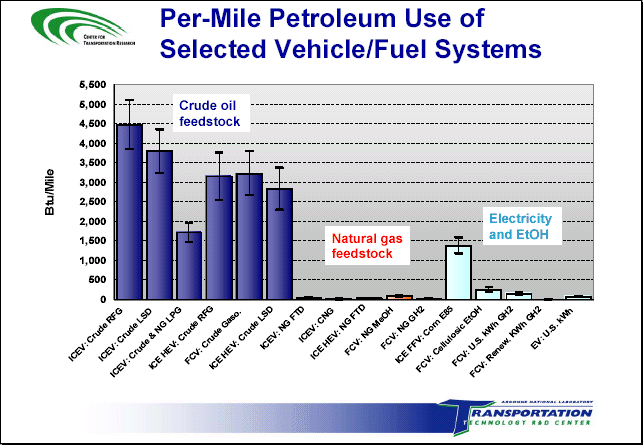
VEVA Comment: This slide shows how we can reduce our dependence on petroleum with two alternate fuels.
We are uncertain of why the FFV (Flexible Fuel Vehicle) running on 85% Corn-sourced ethanol is classed
as Electricity-sourced in this slide. Perhaps petroleum-based transport of the fuel?
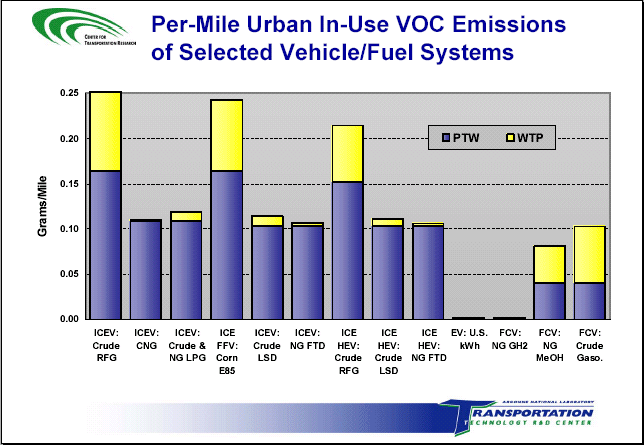
VEVA Comment: Both EVs and FCVs have no emissions of VOCs (Volatile Organic Compounds) to speak of.
One uses a power cord and the other Hydrogen which dissipates harmlessly.
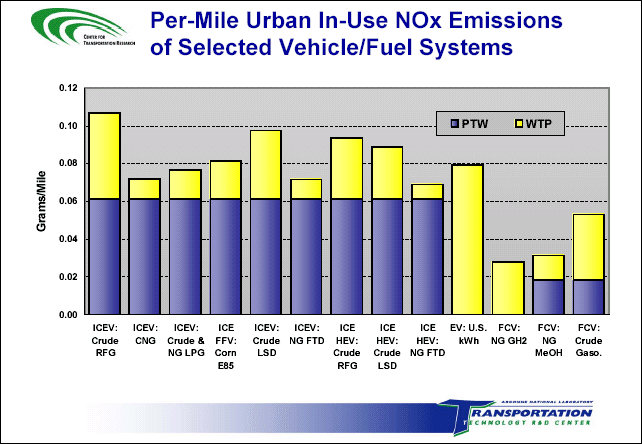
VEVA Comment: NOx is Nitrous Oxides, an Air Care target gas. If the BEV and FCV power sources were
from renewable sources such as hydro, there would be no NOx to speak of.
However, the energy losses from hydrogen generation via electricity make the make the BEV the logical
choice - and it has been available for decades!
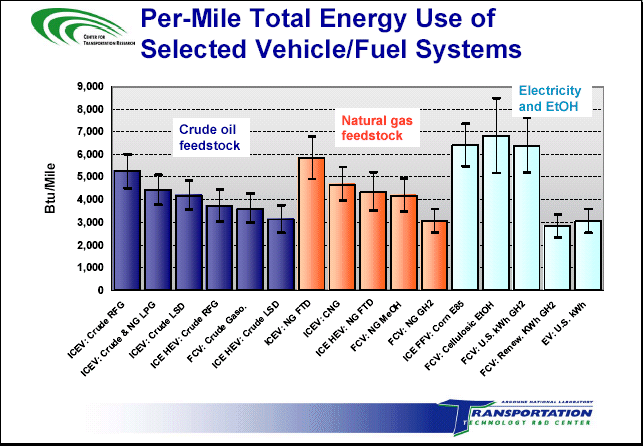
VEVA Comment: Battery Electrics and FCVs are the lowest energy consumers. However, you will not be
able to afford a FCV for a decade or two. You can buy an electric vehicle today.
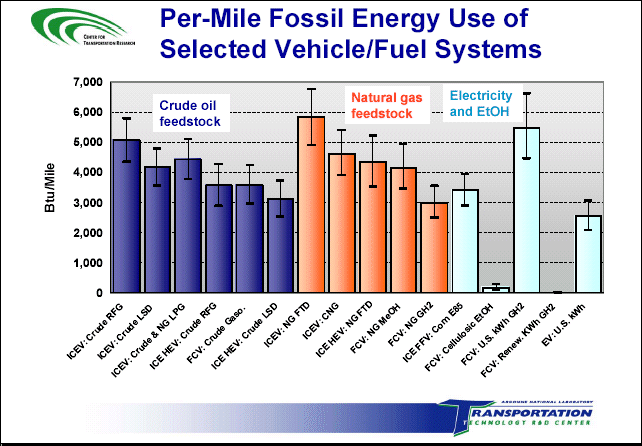
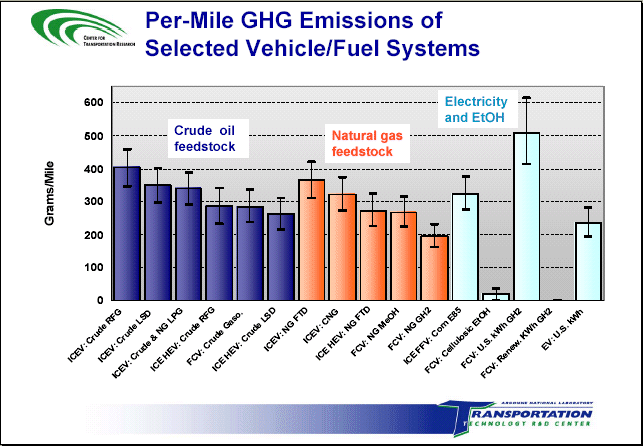
VEVA Comment: These two slides are really the same slide. Logically, GHG emissions are
directly proportional to fossil-fuel use.
Note that FCVs running on hydrogen from renewable sources are the lowest fossil energy users
and thus the lowest GHG emitters.
However, energy conversion costs are a barrier for electric-sourced FCVs.
The BEV recharged from renweable sources is the
best bet today for breaking the dependance on fossil fuels.
Since the incidence of the BEV in the US case is California where the grid is mixed,
there is no category for BEVs charged from renewable sources. If this category were shown,
the height of the bar would be essentially the same as the FCV-renewable one, or essentially zero.
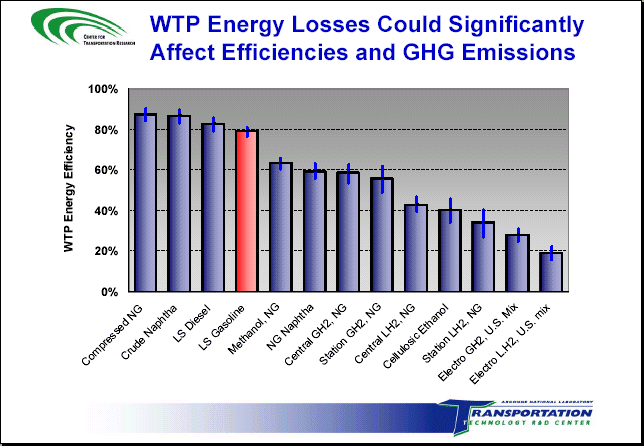
VEVA Comment: Well to Pump Loss. Note that hydrogen delivery from electricity is twice as efficient as
hydrogen from natural gas and four times as efficient as gasoline refined from pumped crude oil and shipped.

VEVA Comment: Greehouse Gas Emissions. Note that electric-sourced hydrogen vehicles have higher emissions
than gasoline-fueled vehicles. This is a graphic demonstration of conversion inefficiencies.
Battery electric vehicle GHG contributions are on a par with hydrogen Fuel Cell
vehicles when their power source is the US Mix. However, in areas where the grid is predominantly powered
from renewable sources, such as BC and Quebec, there are no GHG emissions to speak of.
 What about the fuel economy of the gas car I already have? What about the fuel economy of the gas car I already have?
|